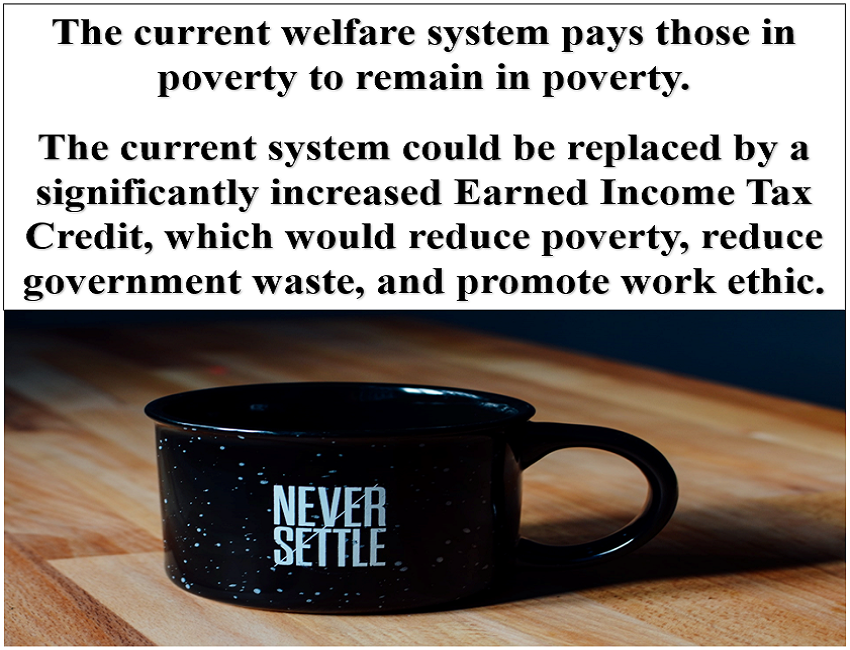
Join our email list to receive free weekly articles. Please enter your email address below.
The current welfare system pays those in poverty to remain in poverty. The current welfare system could be replaced by a significantly increased Earned Income Tax Credit, which would reduce poverty and government waste, and promote work ethic, personal dignity, and a healthy economy.
Despite the federal government spending more than $1 trillion a year on welfare programs, many people find themselves in the “welfare trap” and continue to stay bound to welfare programs rather than becoming financially independent.
When the government promises households significant benefits if they keep their total reported income below or near the poverty line, many households will make an effort to keep their reported income below the poverty line because they would need to literally double their income to afford to live above the poverty line. Because of this, most welfare programs incentivize not working, not economizing and not saving.
For example, a family of three (two adults and one child) that makes $21,000 per year would likely qualify for close to $29,000 in welfare benefits*, for a total of $50,000 per year in income and benefits. But if the family makes $22,000 per year, which is just slightly more than the 2020 poverty line of $21,720 threshold for a household of three, most of their welfare benefits would be eliminated, but they would still remain in poverty with an income of $22,000, but no benefits. Thus, if the family cannot find jobs that produce a household income of over $50,000, the family has great incentive to keep their reported earnings under $21,720. A family of three that makes $21,000 per year would be considered in poverty, but if we consider their non-cash government benefits, their real income is more than $50,000.
Whether a person works fewer hours, works for cash under the table or under-reports tips, the person has an incentive to show less income. Single parents who could economize by having a roommate are incentivized not to have a roommate because of the household income test. For programs that perform asset tests, individuals cannot save money with the goal of investing or buying a house, because they would lose their benefits. And if a person does have money, they can’t put it in a bank savings account to earn a return.
The current welfare system could be replaced by a significantly increased Earned Income Tax Credit (EITC). The EITC is a refundable credit that incentivizes individuals to work, because they receive more benefits as they earn more income, up to a certain level. Replacing ineffective and inefficient welfare incentives with the incentive to work and report income would drastically reduce poverty statistics in a short period of time.
Combining smart economics with compassion and replacing the current welfare system by expanding the EITC promotes work ethic, personal dignity and a healthy economy.
* The estimated approximate value of non-cash government benefits are as follows: $18,000 Medicaid healthcare benefit for a family of three; $3,500 Earned Income Credit; $1,500 Food Stamps; and $6,000 Housing Voucher (assuming rent and utilities of approximately $13,000). Total earned income of $21,000 plus non-cash benefits of $29,000 would equal $50,000, but noting that most of their income is not taxable, their true income is closer to $55,000.
